In the realm of personal finance, few windfalls hold as much potential as proper inheritance management. With an estimated $70 trillion worth of assets poised to transfer from one generation to the next over the next two decades, the opportunities are immense. Yet, astonishingly, more than a third of inheritors actually experience no change or even a decrease in their wealth post-acquisition.
Did that statistic catch your attention? It’s a stark reminder that without careful planning, an inheritance can easily slip through one’s fingers. Imagine taking over a substantial sum only to find it dissipating into a few indulgent vacations or a shopping spree. Before long, the inheritance is gone, and the legacy it carried seems to vanish as well. This makes the aspect of inheritance management important to grasp.
Table of Contents
Maximizing Your Inheritance: Four Preliminary Steps
Receiving an inheritance is meant to be a blessing, a legacy passed down from loved ones. Yet, without a strategic approach, it can turn into a burden. To make the most of the legacy left for you, follow this advice:
Take It Slow
Grief often clouds our judgment. In the aftermath of losing a family member, major financial decisions can feel overwhelming. The good news is that immediate decisions aren’t mandatory. Allow the inheritance to remain untouched for a period while you navigate through the grieving process.
If you’re faced with a lump sum, consider placing the funds in a money market account temporarily. Use this time to heal, reflect, and eventually develop a comprehensive plan of action.
Honoring Their Memory
Behind every inheritance lies a legacy of hard work and sacrifice. Remembering the origins of your the assets you inherit is crucial. Ask yourself: Will the choices I make honor the memory of my loved one? This question adds weight and purpose to your decisions, encouraging you to be intentional and responsible in managing the legacy you’ve received.
Within every asset you inherit, a tapestry of stories, endeavors, and sacrifices is interwoven—a legacy that extends far beyond the sum of its financial value. It’s a reminder that money is often not just a transactional medium; it’s a vessel that carries the essence of hard work, dedication, and dreams realized. This is why acknowledging and preserving the legacy within what you inherit is of paramount importance.
Inheritance management is more than a financial exercise; it’s a testament to your role as a steward of a legacy. The choices you make ripple through time, impacting not only your own life but also the lives of those who will follow. This realization instills intentionality and responsibility into your actions.
By aligning your decisions with the memory of your loved one, you infuse each choice with a deeper purpose. Whether you’re investing, saving, or giving, you’re carrying their legacy forward—one that’s rooted in hard work, sacrifice, and dreams realized.

Building Your Dream Team
An influx of wealth often brings forth a flood of advice. To navigate through the noise, assemble your own team of experts—a “board of advisors” who can guide you through the complexities. Depending on the nature of the assets left behind for you, you might seek counsel from professionals such as:
- Certified Public Accountant (CPA) or tax advisor
- Insurance agent
- Investment professional
- Estate planning attorney
- Tax attorney
- Real estate agent
Remember, these professionals are not there to dictate your choices. They are educators who will help you understand your options, enabling you to make informed decisions aligned with your family’s best interests.
Optimizing a Cash Inheritance
Remember that every dollar needs a purpose—much like you assign roles to dollars in your monthly budget. A cash inheritance isn’t any different. Just as you allocate funds to give, save, and spend in your budget, do the same with what you inherit.
Giving thought to each dollar’s role ensures you won’t end up wondering where the money disappeared. By reframing your approach to the inheritance within these contexts, you weave intentionality into your financial decisions.
In a financial landscape poised for a monumental wealth transfer, seize the opportunity to make the most of what you inherit. With careful planning, you can be a steward of a legacy that carries forward—nurturing your family’s future and ensuring that the windfall serves as a catalyst for prosperity, not just for you, but for generations to come.
Frequently Asked Questions – FAQ
What are the potential challenges in inheritance management?
Challenges can include legal disputes, tax implications, family conflicts, and complex asset distributions. Efficient management however helps mitigate these challenges.
Can efficient inheritance management help prevent family conflicts?
While it cannot guarantee the prevention of conflicts, a well-planned management strategy can significantly reduce the likelihood of disputes by providing clarity and transparency in asset distribution.
Are there any tax considerations in inheritance management?
Yes, inheritance can be subject to various taxes, such as estate taxes or inheritance taxes. Consulting with a tax expert can help you plan to minimize these tax liabilities.









